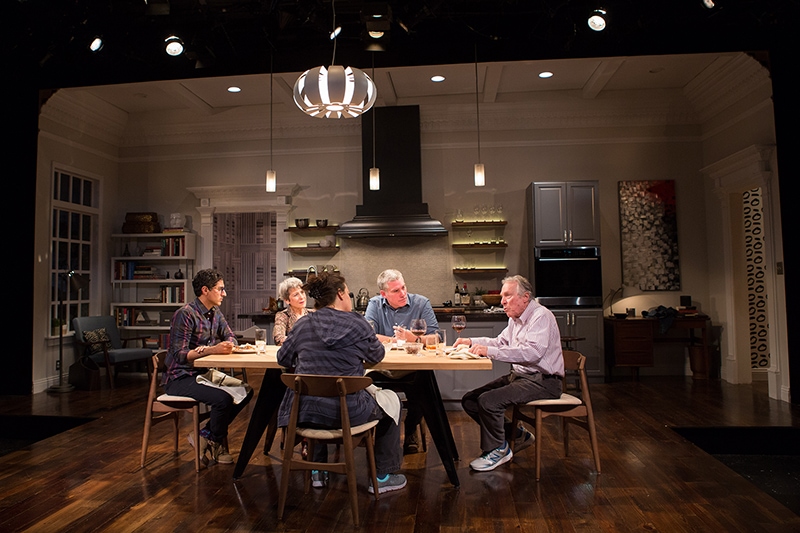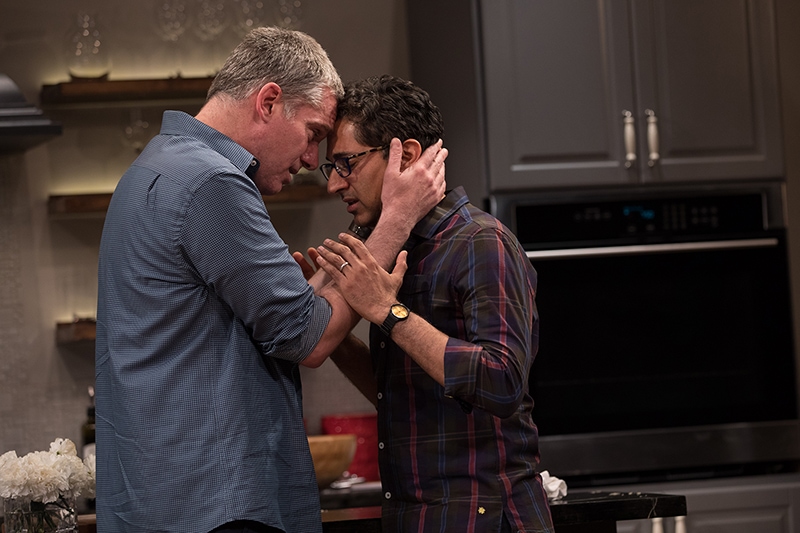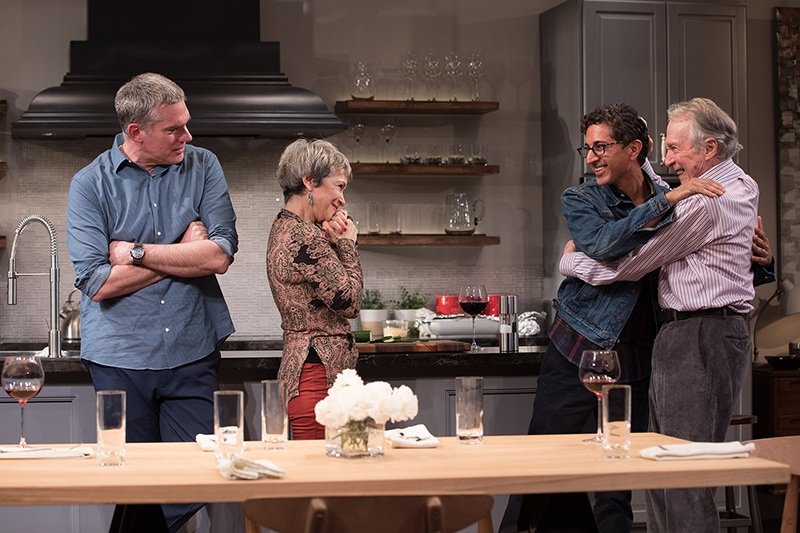They have such a tasteful, immaculate, picture-perfect kitchen, how could their marriage be such a sorry mess? That’s a crass way to ask the question, but the answers are beautifully nuanced in Ken Urban’s new play The Remains, a riveting comedy that mourns a gay marriage on the rocks.
Set Designer Wilson Chin has indeed built a kitchen, a vision in stainless steel and white, that William-Sonoma fans would swoon over. We are, the program tells us, in Boston’s South End in 2014, and here we meet two men who got married ten years ago, just as soon as same-sex marriage became legal in Massachusetts: Theo (a stolid Glenn Fitzgerald), who seems already stricken with some sorrow as he prepares a salad on the cooking island, and Kevin (a magnetic Maulik Pancholy), amiably at work writing about Kierkegaard on his laptop at the kitchen table.

They have invited for dinner Theo’s doting mother Trish (Naomi Jacobson) and professorial father Len (Greg Mullavey) and Kevin’s force-of-nature sister Andrea (Danielle Skraastad) because they have some news they wanted to tell in person. The big disclosure (which doesn’t come till nearly halfway into the play) is that Theo and Kevin have decided (mutually and amicably, they say) to get a divorce. That’s technically no spoiler because really what The Remains is about is the backstory of that decision, the details of which Urban doles out suspensefully with the fascination of a page-turner. “It’s complicated,” as the expression goes—but to say so of this gay divorce does not to do justice to the snappily funny and ultimately wrenching writing and acting that Director David Muse has fine-tuned before us on the Studio Theatre Mead stage.
We genuinely come to believe that their marriage once was solid and the love that was is not gone. Trying to put a happy spin on the announcement, Kevin says to all assembled:
Kevin: There is a lot of love still. Between us. I mean. Theo and I have been a couple for seventeen years. And so. Even though we will no longer be married, my love for him, that hasn’t… that hasn’t changed. He is. Theo is the love of my life….
And later, while Kevin is out, Theo confesses to Andrea in sadness:
Theo: I love your brother more than anyone.
As the play steadily lets us in on what went wrong and why (and with whom)—details best discovered not given away—we are put in a plaintive kind of place. We are watching a relationship unravel that might have gone on but couldn’t, and there’s no “if only” or “what if?” to make it mend.

On top of the first-rate cast, the production features superb stagecraft (including lighting by Jesse Belsky and sound by Matthew Nielson) that near the end holds startling surprises, not unlike the unsettling breakup that Urban has made us privy to. And for anyone inclined to philosophical reflection, there is enormous pleasure to be had in Urban’s weaving of ethical reflection into the script. Kevin is into Kierkegaard and Len is a Hegel scholar, and there is some byplay between them that in a sly way comments on Theo’s and Kevin’s impending divorce:
Len: We face ethical dilemmas every day. A decision must be made. But most days, it’s not a question of one choice being right and the other being wrong. Either choice is right and wrong, to some degree. That’s the tragedy of life.
Kevin: Kierkegaard. Kierkegaard’s version of tragedy is superior to Hegel’s…. He called the experience of the tragic hero, “the suffering contradiction.” You want two things and you cannot have both of those things. And so you suffer. Even if you choose. Especially if you choose. Cause you want both things. And any choice means loss.

In one sense, The Remains is a uniquely gay dramedy, a narrative particular to two men who once seemed a perfectly compatible couple but who now face consequences particular to their sexualities that are pulling them apart. Put simply, The Remains is a landmark play that faces forthrightly the fact that gay divorce necessarily accompanies marriage equality. But with extraordinary precision, The Remains also achieves a universality, raising poignant questions not unfamiliar within many a heterosexual marriage—questions about truthfulness and trust, questions about loneliness and lust…
See it with someone you love, someone you live with, someone you like a lot, or someone you might like a thoughtful laugh with.
Running Time: Approximately 90 minutes, with no intermission.
The Remains has been extended through June 24, 2018, at Studio Theatre – 1501 14th Street NW in Washington, DC. For tickets, call the box office at (202) 332-3300, or purchase them online.





